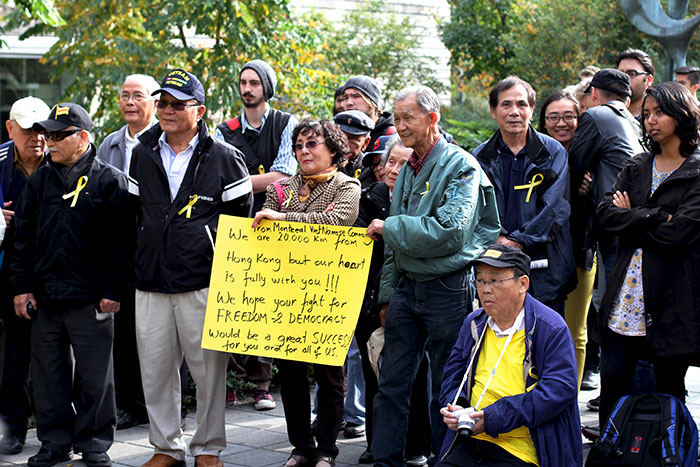McGill students rallied in front of the McConnell Engineering Building near the Milton Gates on Wednesday in solidarity with thousands of pro-democracy protesters in Hong Kong, who are calling for free elections in 2017. The protests come in response to the Chinese government’s laws regulating who will be permitted to run for election to become the leader of Hong Kong. Recent events have attracted international media coverage.
The event, organized by students and endorsed by the Quebec Public Interest Research Group (QPRIG) McGill, was also attended by professors and members of the Montreal immigrant community.
The decision to hold the rally at McGill University was a symbolic one, according to Michael Law, U2 Arts, who was involved in organizing the rally.
“[This] shows that we’re in solidarity with the students in Hong Kong, and that we know that an empowered people will empower others and a freed person will free others,” Law said. “Democracy is contagious and this is a non-hierarchical, grassroots movement.”
During the rally, Law addressed the issues that students in Hong Kong are currently facing.
“The students […] are fighting an uphill battle against an undemocratic government and are being brutalized by the police with excessive force while they exercise their right to assembly in a peaceful manner,” he said.
Catherine Lu, professor of political science, attended the rally but questioned its effectiveness.
“I am not actually sure what kind of impact such movements can have,” she said. “I am just here because I want to express some kind of solidarity with the students who are protesting in Hong Kong against the electoral process.”
This hesitancy was shared by Juan Wang, a McGill professor of contemporary Chinese politics.
“I don’t think [the protests] will affect the Chinese government’s decision in any way,” Wang said. “[There] are always anti-Chinese government protests, whether it’s [in] Tibet, [by] students, or [by] Chinese [people] living abroad [….] It doesn’t really change the Chinese government’s policy [….] I am not sure to what extent this foreign support would substantively affect the protests in Hong Kong.”
The protests in Hong Kong have been compared to the Tiananmen Square events of 1989, when the central Chinese government cracked down on pro-democracy demonstrators in the Square with tanks and armed forces. Professor Wang explained that the two events, while sharing some features, were very different.
“The comparison is mainly because its a student protest and because it’s large-scale and in general it’s pro-democracy,” Wang said. “[However,] what the students back in 1989 called democracy might be very a very different thing than what the Hong Kong students want now. In terms of the overall political environment, the Chinese government had much tighter control back in 1989 [….] Hong Kong does have a system—even though it is not direct elections—it does have a very relaxed political environment compared to mainland [China.] I can see the protests going on for a while, but I don’t really see how [the participants] in [current] protests [are] similar to what we saw in 1989.”
Wang said that she was not surprised that students were at the forefront of the demonstrations in Hong Kong and abroad.
“When you look at large-scale protests in many countries, in many instances, it is always students,” she said. “Students are easily organized [and] have more time. They are idealists; they tend to have a more liberal ideology, a more radical ideology.”










Thanks for sharing such valuable information. If anyone wants to cheap flights to Delhi from Boston in unbeatable price then call our travel experts.